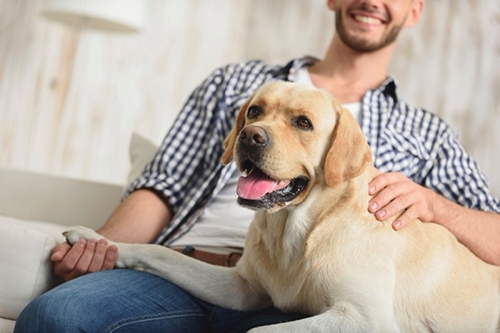Select a category
Advertisement

Is Your Dog Really Happier Now That You Are Home All The Time?
4 years ago
When the world turned inward, we all assumed there was one family member who was making out like a bandit: the dog. In fact, a recent survey from Banfield Pet Hospital revealed that 45 percent of pet owners believe their household's happiness has increased while spending more time with their pet during quarantine. There's no doubt how we humans are feeling, but what about our dogs? Is Elmer really happier now that we're home all the time? We spoke to several canine experts to find out what's actually going on in your dog's brain as you isolate together.
Your dog gets a "happy neurohormone" boost
Dr. Brian Hare, associate professor of evolutionary anthropology at Duke University, founder of the Duke Canine Cognition Center, and instructor of Dog Cognition and Emotion says, "Dogs are pretty much the clear winners during quarantine." Oxytocin, a neurohormone in both dogs and humans-also known as the "love hormone"-increases over feelings of bonding and pleasure. So, when dogs and their owners make eye contact (which is probably happening a lot more when everyone is home), "it's kind of like we are hugging each other with our eyes." Huh, that is exactly what it's like to have a dog, isn't it?
The region of their brain that prevents depression is stimulated
But there's more than that huggy-feely stuff.
Advertisement
And it even helps your dog's brain develop
"Following the owners' gaze, emotional expressions and gestures activate superior temporal gyrus in a dog's brain," Sievert expands. "This area is responsible for dynamic face recognition. And listening to an owner's speech activates the parietal-temporal cortex." These factors are particularly essential for brain development in puppies.
Advertisement
But big changes could make your dog anxious
As social isolation has upended your normal schedule, it's also affected Elmer's. Think about it: Sure, you love working from home once in a while. But now that you're forced to do it every day, it can feel like too much of a good thing. Behavior research scientist and Chief Veterinary Officer at Purina, Dr. Ragen T.S. McGowan, points out that your pup probably had a nice little routine while you were gone-and we're guessing it included some quiet, long naps. "Now," says Dr. McGowan, "The hustle and bustle of having people home all day is likely disrupting your dog's routine. Depending on your dog's personality, he might be having difficulty adjusting to this new normal and may even be acting out a bit." Dogs can develop anxious behaviors when there are changes to their environments, even if it's just spending more time with you. (Don't take it personally.)
"Any change in a dog's routine can lead to stress," says Dr.
Advertisement
In the practical sense, however, Dr. Coates says while you may not notice those types of changes, you may notice your dog becoming clingy or looking to you for comfort. Some, on the other hand, may become withdrawn.
Advertisement
Remember: your stress can stress your dog out
Your mental health affects your dog's mental health. Per Dr.
Advertisement
At the end of the day, you and your dog are emotionally and physiologically bonded
Oxytocin-the love hormone-is no joke. So, use this time to form an even stronger bond with your pet. And while, yes, there is a lot going on in your dog's brain as you stay home all day together, it's important to adapt to this new normal together: exercise together and relax together (or alone at the same time). Most importantly: Establish a routine.
Advertisement
Disclaimer If this post is your copyrighted property, please message this user or email us your request at [email protected] with a link to this post
Advertisement
 Caster
Caster